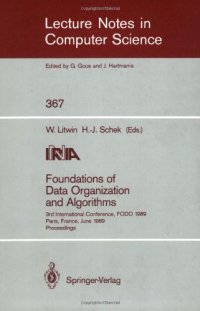
Ebook: Foundations of Data Organization and Algorithms: 3rd International Conference, FODO 1989 Paris, France, June 21–23, 1989 Proceedings
- Tags: Database Management, Information Storage and Retrieval, Information Systems Applications (incl.Internet), Algorithm Analysis and Problem Complexity, Artificial Intelligence (incl. Robotics), Computer Graphics
- Series: Lecture Notes in Computer Science 367
- Year: 1989
- Publisher: Springer-Verlag Berlin Heidelberg
- Edition: 1
- Language: English
- djvu
The Third International Conference on Foundations of Data Organization and Algorithms has been organized by INRIA in Paris from June 21 to 23, 1989. Previous FODO Conferences were held in Warsaw, 1981, and in Kyoto, 1985. The goal of this year's conference is to present advances in techniques of permanent and temporary data organization in different fields. New applications such as image processing, graphics, geographic data processing, robotics, office automation, information systems, language translation, and expert systems have developed various data organizations and algorithms specific to the application requirements. The growing importance of these applications has created a need for general studies on data organization and algorithms as well as for specific studies on new database management systems and on filing services. The articles submitted for the conference were subject to the usual rigorous reviewing process and selected on that basis. They offer an excellent snapshot of the state of the art in the field and should prove invaluable for computer scientists faced by the problems of data organization which are raised by these new applications.
The Third International Conference on Foundations of Data Organization and Algorithms has been organized by INRIA in Paris from June 21 to 23, 1989. Previous FODO Conferences were held in Warsaw, 1981, and in Kyoto, 1985. The goal of this year's conference is to present advances in techniques of permanent and temporary data organization in different fields. New applications such as image processing, graphics, geographic data processing, robotics, office automation, information systems, language translation, and expert systems have developed various data organizations and algorithms specific to the application requirements. The growing importance of these applications has created a need for general studies on data organization and algorithms as well as for specific studies on new database management systems and on filing services. The articles submitted for the conference were subject to the usual rigorous reviewing process and selected on that basis. They offer an excellent snapshot of the state of the art in the field and should prove invaluable for computer scientists faced by the problems of data organization which are raised by these new applications.